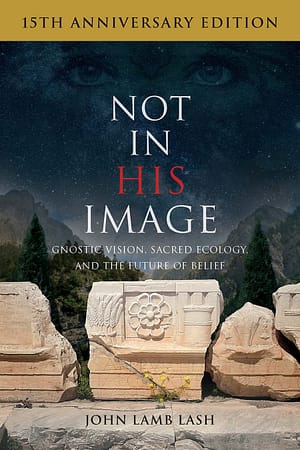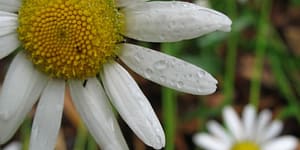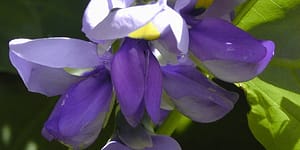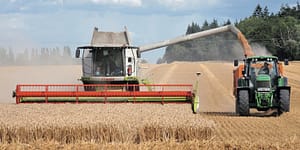Not in His Image: Where It All Began

Since its initial release to wide acclaim in 2006, Not in His Image has transformed the lives of readers around the world by presenting the living presence of the Wisdom Goddess as never before revealed, illustrating that the truth of an impactful Gnostic message cannot be hidden or destroyed.
The following is an excerpt from Not in His Image (15th Anniversary Edition) by John Lamb Lash. It has been adapted for the web.
From an early age I was a voracious reader, but growing up in the coastal village of Friendship, Maine—population nine hundred souls, about a third belonging to the Lash clan—did not provide me with access to a wide range of books. Thanks to my overbite, I had to take time off from school and go “down east” (up the coast) to Bangor, the only town in the region with an orthodontist. It was quite an excursion for the family, as we did not get out of the village very often. Apart from New York City, where I occasionally visited, Bangor was the biggest city I knew all through my teens.
The trip took an hour and a half each way on Route 1, but the session at the orthodontist rarely took half an hour. Although we were too poor to have much spending money (my stepfather was a native Mainer and lobster fisherman), we usually hung around Bangor for a couple of hours, just because we were there. Occasionally, we even had lunch in a café. That was a major event. I carefully saved the money I made caulking boats and mowing lawns for the Bangor trips. While the family window-shopped, I would go off on my own and scout around. My forays yielded two momentous discoveries. One was Viner’s music shop where I discovered jazz and percussion (Enoch Light and the Light Brigade), not to mention a vivacious blond salesgirl with whom I flirted outrageously. The other was Bett’s Stationery Shop and Bookstore.
Bangor is a college town, being the largest city close to the campus of the University of Maine at Orono, up the Stillwater River. In the back of Bett’s was a book nook where they stocked authors of interest to the college crowd. This was a hallowed spot to me. I had never seen such names and titles, but I seemed to be drawn infallibly to the ones suited to my spirit. At Bett’s I found Ulysses and Journey to the End of the Night, two novels that had a profound effect on my views on literature and life, respectively. And I found other books that determined my direction in life: an existentialist anthology called The Search for Being with selections from Schelling and Sartre, the plays of Samuel Beckett, the poetry of W. B. Yeats and Salvatore Quasimodo. Then, one day toward the end of my three-year orthodontic ordeal, I came across Thus Spake Zarathustra in the translation of R. J. Hollingdale. I knew something of Nietzsche but had never read a single word he wrote. The moment I began to riffle the book, I was electrified. When I joined my parents and sister for lunch, I rudely continued to read through the meal. And in the back seat of the car on the way home, I stayed glued to the book. My excitement was so intense that I had to read some passages aloud. I started with a section from The Gay Science (cited in the introduction), containing the famous announcement that “God is dead,” then jumped to Zarathustra’s prologue:
I teach you the Superman. Man is something that should be
overcome. What have you done to overcome him?
The Superman is the meaning of the Earth. Let your will say:
The Superman shall be the meaning of the Earth.
I entreat you, my brothers, remain true to the Earth, and do
not believe those who speak to you of superterrestrial hopes.
They are poisoners, whether they know it or not.
In the front seat my parents sat in stunned silence. They were timid people with no intellectual interests, no notions of philosophy. My step- father barely eked out a living—not surprising, since his livelihood depended on elusive crustaceans whose mating habits had (in those days) never been observed by our species. To my distress and disappointment, my parents often expressed perplexity and fear about the difficulties of survival. Their spiritual life consisted of lukewarm allegiance to the fundamentalist cult of Advent Christians that dominated the village. I could not believe that I was finding in Nietzsche exactly what I wanted to say to them about themselves, and about the beliefs they held, which I was expected to accept as my beliefs. All the way home I kept reading, caught in the manic exaltation Nietzsche must have felt when he wrote them. In “On Reading and Writing,” I hit upon my personal credo:
You look up when you desire to be exalted. And I look down,
because I am exalted.
Who among you can at the same time laugh and be exalted?
Who climbs upon the highest mountains laughs at all
tragedies, real or imaginary.
Untroubled, scornful, outrageous—that is how wisdom
wants us to be: she is a woman who never loves anyone but a
warrior.
The words were engraved in my memory the first time I saw them. In the months that followed, coming up to my seventeenth birthday, I delved deeply into Nietzsche’s “transvaluation of all values,” centered on his radical critique of Christianity. Two points struck me as totally right: Christian religion defines morality by a belief system based on a master-slave relationship, and rooted in resentment of the raw beauty and power of the life force. These two insights liberated me, for Nietzsche was stating something I already sensed that lay beyond my capacity to articulate. But at the same time, they burdened me. When I read more of Nietzsche, I realized that he had not gone far enough or deep enough in his analysis of “that crapulent faith.” So I made a commitment to myself. I swore to finish what Nietzsche had begun. I vowed to think through and live out his critique of Christianity to the end.
This book is the result of that vow, made some forty years ago by a bucktoothed teenager whose dental defect led him to this destiny.
Recommended Reads
All In the Question: What If We Started Asking Better Questions?
Recent Articles
Oxeye daisies are one of the most important plants for pollinators including beetles, ants, and moths that use oxeye daisies as a source of pollen and nectar. Instead of thinking about removing a plant like oxeye daisy, consider how you can improve the fertility and diversity of habitat resources in your home landscape, garden, or…
Read MoreThis long-lived perennial legume is used for forage and erosion control. Kudzu is edible with many medicinal uses and other applications. Pollinators of all kinds love its prodigious lavender blooms!
Read MoreMove aside, maple! We have two new syrups to add to the table. Read on for insights on tapping, selling, and eating syrup from walnut & birch trees.
Read MoreWhy is modern wheat making us sick? That’s the question posed by author Eli Rogosa in Restoring Heritage Grains. Wheat is the most widely grown crop on our planet, yet industrial breeders have transformed this ancient staff of life into a commodity of yield and profit—witness the increase in gluten intolerance and ‘wheat belly’. Modern…
Read MoreDid you ever wonder how leeks, kale, asparagus, beans, squash, and corn have ended up on our plates? Well, so did Adam Alexander, otherwise known as The Seed Detective. The following is an excerpt from the The Seed Detective by Adam Alexander. It has been adapted for the web. My Seed-Detective Mission Crammed into two…
Read More










